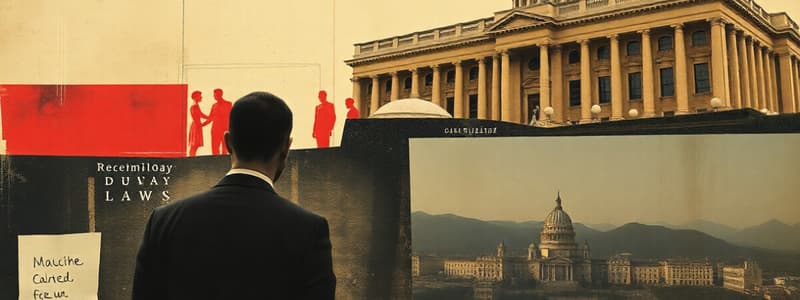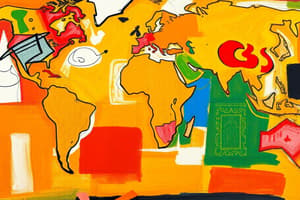Podcast
Questions and Answers
What were two major criticisms of the Nuremberg and Tokyo Tribunals?
What were two major criticisms of the Nuremberg and Tokyo Tribunals?
Victors’ justice and violation of state sovereignty.
How does International Criminal Law (ICL) hold individuals accountable?
How does International Criminal Law (ICL) hold individuals accountable?
ICL places criminal responsibility on individuals for acts defined as crimes by international law.
What is the significance of the ICC in the realm of International Criminal Law?
What is the significance of the ICC in the realm of International Criminal Law?
The ICC is the only permanent court for ICL, focusing on the prosecution of serious crimes of international concern.
Name two alternative accountability mechanisms mentioned in relation to ICL.
Name two alternative accountability mechanisms mentioned in relation to ICL.
In what city is the primary court for International Criminal Law located, and what does it symbolize?
In what city is the primary court for International Criminal Law located, and what does it symbolize?
What paradox exists within International Humanitarian Law (IHL)?
What paradox exists within International Humanitarian Law (IHL)?
Who is credited with the founding of the International Committee of the Red Cross (ICRC) and its establishment?
Who is credited with the founding of the International Committee of the Red Cross (ICRC) and its establishment?
What is the main difference between 'Ius ad bellum' and 'Ius in bello'?
What is the main difference between 'Ius ad bellum' and 'Ius in bello'?
What role does the ICRC play in relation to IHL?
What role does the ICRC play in relation to IHL?
What is one of the primary functions of the ICRC in relation to IHL enforcement?
What is one of the primary functions of the ICRC in relation to IHL enforcement?
What are the core activities performed by the ICRC?
What are the core activities performed by the ICRC?
How does the ICRC function as a watchdog in armed conflicts?
How does the ICRC function as a watchdog in armed conflicts?
What was a major historical impact of World War II on International Humanitarian Law?
What was a major historical impact of World War II on International Humanitarian Law?
What is the primary focus of International Humanitarian Law (IHL)?
What is the primary focus of International Humanitarian Law (IHL)?
How does International Criminal Law (ICL) differ from IHL concerning individual responsibility?
How does International Criminal Law (ICL) differ from IHL concerning individual responsibility?
Name two key instruments of International Human Rights Law.
Name two key instruments of International Human Rights Law.
What is the role of the Geneva Conventions in the context of IHL?
What is the role of the Geneva Conventions in the context of IHL?
In the context of Human Rights Law, what does the acronym CERD stand for?
In the context of Human Rights Law, what does the acronym CERD stand for?
What does IHL primarily aim to protect during armed conflicts?
What does IHL primarily aim to protect during armed conflicts?
Explain the role of the International Criminal Court (ICC) in the context of moot court proceedings described.
Explain the role of the International Criminal Court (ICC) in the context of moot court proceedings described.
What is the primary distinguishing feature between International Humanitarian Law and International Criminal Law?
What is the primary distinguishing feature between International Humanitarian Law and International Criminal Law?
Flashcards
International Humanitarian Law (IHL)
International Humanitarian Law (IHL)
A branch of international law that regulates the conduct of parties to an armed conflict and the protection of certain categories of persons and objects.
International Criminal Law (ICL)
International Criminal Law (ICL)
A branch of international law that focuses on individual criminal responsibility for serious crimes of international concern.
International Human Rights Law (IHRL)
International Human Rights Law (IHRL)
A branch of public international law that deals with the rights and obligations of individuals vis-à-vis their government.
Traditional International Law (TIL)
Traditional International Law (TIL)
Signup and view all the flashcards
Human Rights Treaties
Human Rights Treaties
Signup and view all the flashcards
Nullum Crimen Sine Lege
Nullum Crimen Sine Lege
Signup and view all the flashcards
What is International Criminal Law?
What is International Criminal Law?
Signup and view all the flashcards
What is the ICC?
What is the ICC?
Signup and view all the flashcards
What were the Nuremberg and Tokyo Trials?
What were the Nuremberg and Tokyo Trials?
Signup and view all the flashcards
What is the Rome Statute?
What is the Rome Statute?
Signup and view all the flashcards
Paradox of IHL
Paradox of IHL
Signup and view all the flashcards
Geneva Conventions
Geneva Conventions
Signup and view all the flashcards
Hague Conventions
Hague Conventions
Signup and view all the flashcards
Ius ad bellum
Ius ad bellum
Signup and view all the flashcards
Ius in bello
Ius in bello
Signup and view all the flashcards
ICRC
ICRC
Signup and view all the flashcards
ICRC's Monitoring Function
ICRC's Monitoring Function
Signup and view all the flashcards
ICRC's Promotion Function
ICRC's Promotion Function
Signup and view all the flashcards
What is IHL?
What is IHL?
Signup and view all the flashcards
Who does IHL protect?
Who does IHL protect?
Signup and view all the flashcards
What types of conflicts does IHL apply to?
What types of conflicts does IHL apply to?
Signup and view all the flashcards
What is ICL?
What is ICL?
Signup and view all the flashcards
What crimes does ICL address?
What crimes does ICL address?
Signup and view all the flashcards
What is the difference between IHL and ICL?
What is the difference between IHL and ICL?
Signup and view all the flashcards
What is international law?
What is international law?
Signup and view all the flashcards
How is the course structured?
How is the course structured?
Signup and view all the flashcards
Study Notes
Minor International Law
- Course covers Public International Law (PIL), International Humanitarian Law (IHL/ICL), and Human Rights Law (HRL)
- PIL (5 ECTS), IHL/ICL (5 ECTS), HRL (5 ECTS)
Course Outline
- Course content
- Basic principles of IHL
- Basic principles of ICL
- Differences between IHL and ICL
Teaching Methodology
- Lectures and seminars
- Moot court
- Reading and movies
- Field trip
Weekly Schedule
- Live lectures at THUAS on Fridays from 12:15 to 14:30 in Ov.4.47
- Reading, homework, and group work (some seminars require preparation)
- Guest lectures announced during the course
- Field trip on November 22nd
Assessment
- IHL/ICL accounts for 33% of the overall grade
- Exam = 70% (1.5 hours)
- Moot Court = 30% (separate module book on Blackboard)
- Homework and group work assignments are mandatory for course completion
Moot Court
- ICC proceedings (4 teams): OTP, 2x Defense, Victims Counsel
- Moot court case available before the Fall Break
- Written pleadings (70%)
- Oral arguments (30%)
- Best moot court team (written and/or oral) earns a prize
Field Trip
- Scheduled for November 22nd
- Location details likely to be provided
Literature
- No single textbook; various articles, policy papers, videos, and other publications
- Mandatory and recommended reading is contained in the module book
- Additional materials are available via BrightSpace
Additional Topics (Based on Subsequent Pages)
- War crimes investigations and conflicts (contemporary examples provided)
- ICC convictions and implications (in Mali and other contexts)
- The history and evolution of IHL (including Solferino, the Hague Conventions, WWI/WWII, and the Geneva Conventions)
- Core principles, rules, and applications of IHL (with detailed examples)
- Enforcement mechanisms of IHL
- Role and function of the International Committee of the Red Cross (ICRC) and its partners
- Distinctions between IHL, ICL, and human rights law
- Explanation of the concepts of IHL and ICL, including specific courts, tribunals and instruments
Studying That Suits You
Use AI to generate personalized quizzes and flashcards to suit your learning preferences.





